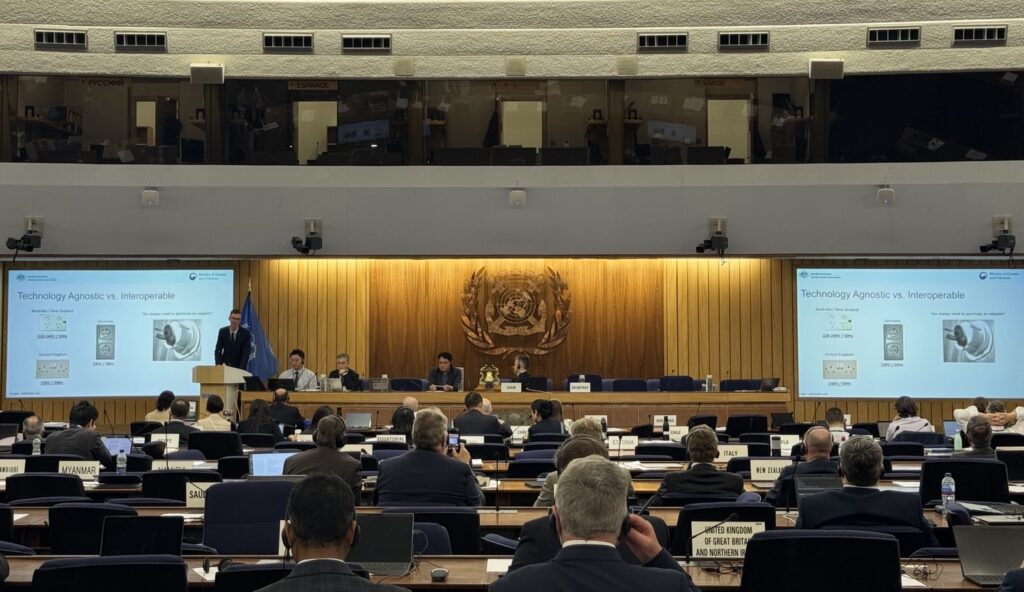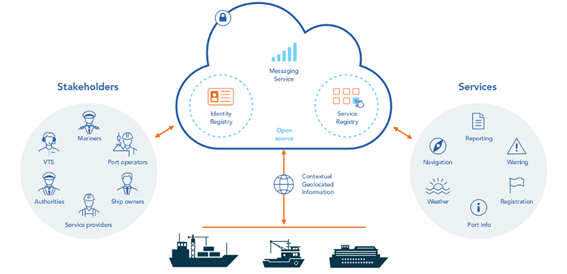Maritime Connectivity Platform
A decentralised platform facilitating secure and reliable information exchange
within the maritime domain and beyond
Fairway to a Connected Maritime World:
The Future of Maritime Digitalization with MCP
NEWS
MCP Takes Center Stage at IMO NCSR 12: Driving Global Standards in Maritime Connectivity (May, 2025)
The Maritime Connectivity Platform (MCP) was prominently featured during the 12th session of the IMO Sub-Committee on Navigation, Communications and Search and Rescue (NCSR 12), held in London. Two key events—the IMO/IHO Workshop on S-100 Implementation (12 May) and the Presentation on Global IP-based Connectivity for S-100 ECDIS (13 May)—highlighted MCP’s role in enabling real-time, secure digital communication at sea.
At the workshop, Dr. Julius Moeller (AMSA) introduced a global connectivity framework based on the SECOM protocol to support real-time exchange of S-100 products like Navigational Warnings (S-124) and Route Plan Exchange (S-421). Mr. Juho Pitkänen (Secretary-General of MCP Consortium) presented MCP as a critical infrastructure for maritime digitalisation, offering authentication, service discovery, and message exchange capabilities—supporting both current and future e-Navigation and MASS operations.
On 13 May, a live demonstration co-hosted by Australia and the Republic of Korea showcased MCP in action. The technical demonstration featured:
- S-124 service discovery and subscription via the MCP Maritime Service Registry (MSR), enabling real-time integration into ECDIS;
- Bidirectional route exchange (S-421) between shipboard ECDIS and VTS.
The demonstration drew strong interest from over 100 delegates and illustrated how MCP provides secure identity management (using Maritime Resource Names), supports real-time updates, and resilient IP-based communication infrastructure. As discussions continue within IMO on establishing a framework for global S-100 data distribution and connectivity, MCP and SECOM are positioned as a practical and scalable solution. The initiative is now recognised as a key enabler of maritime digitalisation, supporting IMO’s strategic vision for safe, standardised, and connected maritime operations.
IALA Endorses MCP Test Instance to Accelerate Maritime Digitalisation
(March, 2025)
IALA members are encouraged to make use of this instance, which will thus be an important enabler of digitalisation and driver for the realisation of e-Navigation.
The newly elected secretary general of the MCP consortium, Juho Pitkänen from Fintraffic states: “The IALA endorsement is an important step forward in the process of making the international community adopting the MCP as a means to support the realisation of e-navigation. When this becomes widely acknowledged, the barrier for digitalisation in the maritime domain at large – would be lowered significantly!”.
The instance is operated by host members of the MCP consortium, KRISO and GLA, and is purely for testing. No performance guarantees are given, and it must therefore not be used for operational purposes.
IALA has created a topical matter web-page for the instance, which is available here: MCP test instance – IALA AISM

The MCP

The information exchanged can be almost of any nature, ranging from private confidential information between a vessel and the shore office of the shipowner, to public information provided by authorities, such as the provision of navigational warnings.
– Endorsing organisations to be MCP service providers